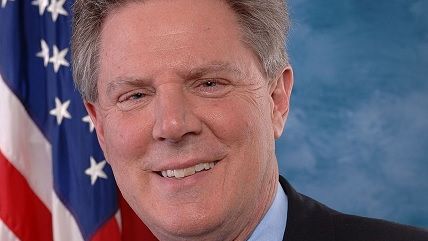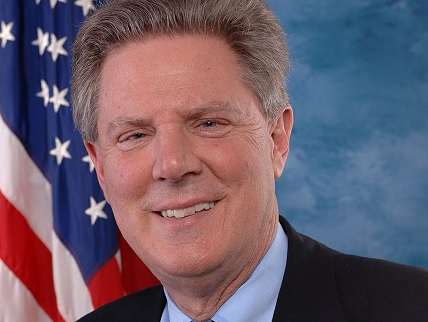Congressman Demands Pokémon Go Makers Tell Him What They Do About Data Usage
No role for Congress.


Rep. Frank Pallone, Jr. (D-NJ), sounds like he doesn't know how a smartphone works or what the role of Congress is.
The ranking member of the House Energy and Commerce Committee fired off a letter along with two Democratic colleagues demanding Pokémon Go explain what it does about how much data its users use playing the game.
"We are writing to better understand what measures Niantic has undertaken to ensure consumers are informed of Pokémon Go's effect on their mobile data usage," the letter begins, continuing by explaining that the app had been downloaded 7.5 million times in its first week out and earned "an estimated $2.3 million day on the iOS and Android platforms. The reference to revenue is totally gratuitous and unrelated to anything else Pallone brings up. He does not mention that Pokémon Go is a free app or that he has no business getting involved with Pokémon Go and data usage in the first place.
Amazingly, while trying to whip up fears over Pokémon Go and data usage, Pallone cites a Wall Street Journal article titled "Relax, Pokémon Go Isn't Eating Your Data Plan," which reports that according to Verizon the app takes up less than 1 percent of its total data traffic. Pokémon Go, like any sophisticated app, can drain battery life, but it does have a setting for "battery saver." Battery usage is a problem for many smartphone users and one smartphone makers have long been working to improve. Like data usage, battery usage isn't any of Pallone's business either.
It's up to individuals how much they want to consider their data usage when playing Pokémon Go. Most smartphones allow you to check data usage by app—I've used about 300MB of data on Pokémon Go in the last two weeks, hardly my most data-taxing app—and there are even apps to help monitor data usage instead.
But Pallone could relax even if that weren't the case, because issues like data usage on Pokemon Go are outside the purview of Congress. It's notable too that the concept of net neutrality, which Pallone and Democrats tend to support, make it harder for service providers and app operators to minimize the cost of data usage because "net neutrality" doesn't permit treating data spent on Pokémon Go to be treated differently than data used on any other program or internet service. If Pallone is interested in contributing, he could work to roll back net neutrality controls.
Frank Pallone ends with four questions he asks Niantic to answer, none of which it should feel compelled to answer and none of which are intelligent enough to be worth asking. He wants to know whether there are "best practices" Niantic follows to minimize how much data is used (their code is none of Pallone or the government's business), whether it works with carriers to "ensure that consumers are not unexpectedly hit with large overage charges," (this is non-sensical as other apps use even more data), whether it warns consumers about data usage (again, nonsensical given that Pallone has overblown the data impact), and most incredibly, whether it had "any mechanisms in place to make sure consumers are made whole in the event they are hit with an unexpected overage charge resulting from the use of your app." Why would anyone but the user of a phone be responsible for the data they use?
I wouldn't even say Congress has more important things to concern itself about. Even if Congress didn't have anything to concern itself with—no self-created foreign policy, fiscal and other messes to get itself out of—Pokémon Go would still not be something that's appropriate for Congress to concern itself with.
If Frank Pallone has concerns about Pokémon Go, he should free to quit his job in Congress and work on developing an augmented-reality game he thinks is superior. Otherwise he should shut up and not use the pulpit of political office to bully a company that did develop an augmented-reality game it and millions of users enjoy.
Thankfully it's still possible to ignore politicians.


Show Comments (52)